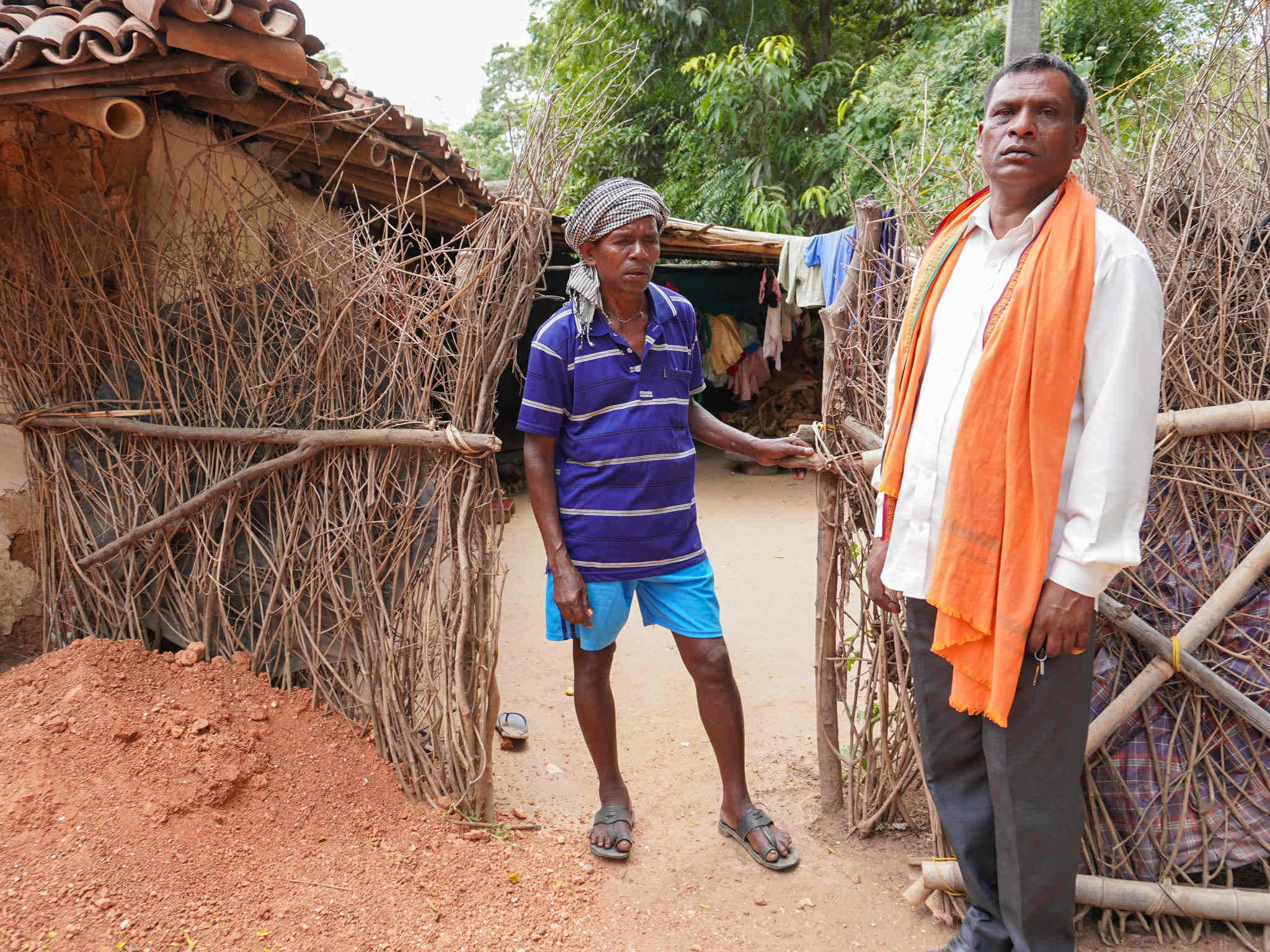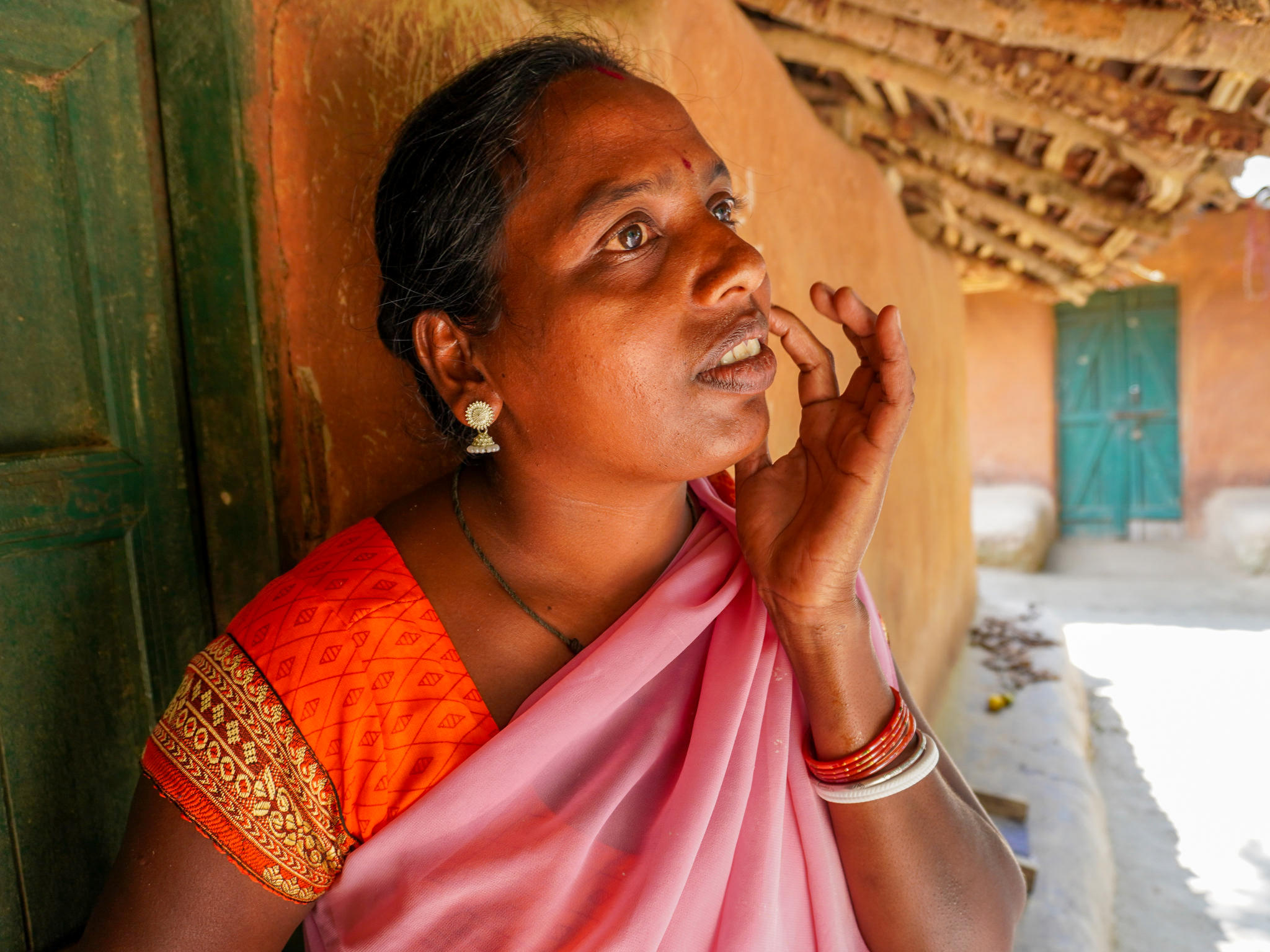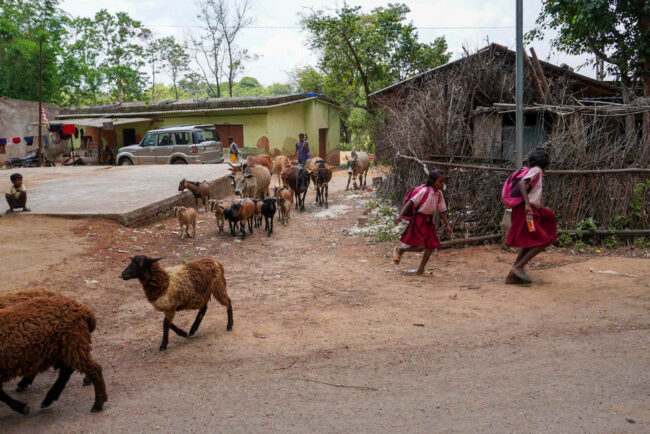KHUNTI, JHARKHAND — Most days, Mahavir Das Goswami rides an old black motorbike through narrow roads that snake through Khunti district. He tries to visit four or five villages.
One pleasant June morning, he reaches Kanki village, where a small group has gathered under a tree to wait for him. One person tells him that he has insufficient grains and is hungry. Another needs a loan for his son to go to college. A third asks Goswami for help in getting his pension funds released. Goswami listens to them all carefully, sometimes taking notes and many times giving them phone numbers of other people who might help them.
“I am a social worker,” he says. “I am doing God’s work.”
Goswami is a member of the Vanvasi Kalyan Ashram, an organization associated with the Rashtriya Swayamsevak Sangh, a Hindu nationalist group that is the ideological parent of Prime Minister Narendra Modi’s Bharatiya Janata Party.
His outreach is about helping people, but also about strengthening Hindu identity in Jharkhand, a central state with dense forests, poor infrastructure and high levels of poverty. One in four people here call themselves Adivasis — people who have existed since the beginning of time. The term comprises a handful of indigenous, largely animistic belief systems built on the worship of rivers, trees, hills and other parts of nature. For centuries, Adivasis have lived alongside Hindus, borrowing symbols and rituals over time. More recently, in the 19th and 20th centuries, Christian missionaries came to the area, and many Adivasis incorporated elements of that faith as well — including many who converted entirely.
Hindus make up about 26% of the population of Khunti district, only marginally more than the number of Christians, at just over 25%, according to the 2011 census, the last one conducted by the Indian government.
But now, Hindu nationalists are pushing hard to claim the Adivasis, as well.
“We believe that the tribes in Jharkhand are all Hindus,” says Kameshwar Sahu, a regional leader of Vanvasi Kalyan Ashram in Ranchi, the capital of Jharkhand.
For Sahu and other Hindu nationalists, efforts to bring Adivasis into the Hindu fold isn’t about conversion, but rather something they call ghar wapsi, which means “a return home,” with the belief that all people in the Indian subcontinent were originally Hindus.
There are political implications, but the core motivation is to establish a national Hindu identity. That’s the goal of the Modi government. The approach is a tightrope walk by the Rashtriya Swayamsevak Sangh to encourage adherents of tribal faiths to keep some of their practices, while increasingly rooting them in Hindu ideology. When the Rashtriya Swayamsevak Sangh and its affiliated organizations provide basic services to people of any faith, they’re more likely to align with Hinduism, Goswami and others say.
Goswami, the ad-hoc social worker, says he’s brought 1,000 people back to Hinduism over the past five years in Khunti alone.
In these battles for conversion, religion itself is brought up only slantingly. Services like health care and education are used as entry points into deeper affiliation. That’s a long-standing tactic, says Dinesh Narayanan, author of “The RSS and the Making of the Deep Nation.”
“The Hindu groups have copied the Christian playbook in this,” he says.
Hindus do not believe indigenous people predate the faith’s existence, Narayanan says. They believe Hinduism has existed since the dawn of time.
“That’s why they reject the term Adivasi,” he says. They call them “vanvasi” — forest dwellers — instead.



Binita Munda has been married for 10 years. She and her husband have been trying to have a baby for nearly that whole time.
“I barely bleed during my period,” she says, so she is certain she needs medical help.
But she’s not sure how to get it. One general physician she consulted about a year ago asked her to get an ultrasound done.
“No one in my family has ever gotten an ultrasound,” she says. It’s scary, she admits, plus she doesn’t have any money.
Goswami positions himself as the solution to her problems. In one swoop, he convinces Munda’s in-laws to let her go to the gynecologist.
“I will arrange for doctors in one of our Hindu trusts to examine her for a lesser fee,” he says.
Goswami says it is a good day when he gets to help more than three families.
“If we don’t send them to our hospitals and our schools, they will go to Christian schools and become Christian,” he says.
This approach has led to consternation among local Christian leaders.
“We try and help people like Binita Munda with their health condition,” says Susheela Purti, an elected member of the decision-making body for Kanki Block for a decade now. She is a block level officer, responsible for raising local issues at the district office. She is also affiliated with the local Christian church.
Purti says she brings to the district office issues that any local person has, without discrimination.
“In a village, we have to treat everyone equally because we live symbiotically. Everyone is dependent on one another,” she says.
But, Goswami says, many people in positions of power in local governments are Christian.
“They hold government funds and benefits that we should receive,” he adds.
Munda, on the other hand, isn’t sure what religion she follows.
“Maybe Sarna?” she says.
Her surname, Munda, is the name of her tribe, and Sarna is the ancient animistic faith that’s gained traction among her people in recent years.
Would Munda convert to Christianity or Hinduism if either helped her with her medical condition? “I don’t care what faith I am asked to follow, as long as I have a child,” she says.



A resurging Sarna faith
People who identify as Sarna have been increasing in the past few years. Over 4 million people identified themselves as Sarna in the 2011 census.
Sarna believers pray to mountains, rivers, trees, insects and the earth, says Bandhu Tigga, a Sarna priest in Mudma village.
“Since we pray to everything nature has to offer, many Adivasis are not opposed to praying to an idol when they are promised something in return,” he says.
Tigga says his work is to help Adivasis recognize that other religions are political.
“Sarna is not; it is about being in harmony with everything around us,” he says.
However, in districts with strong Sarna groups, the election results in November 2024 were determined by them. “This means we need to assert our own identity,” says Bandhu Tirkey, a former elected member to the Jharkhand assembly. “We have to be ourselves, not Hindu or Christian.”
This assertion has brought about a wave of what Sarna groups call “reconversion.”
In Ranchi district’s Malti village, Sandeep Oraon was a Christian until three years ago.
“We became Christian 13 years ago when a local church said my mother’s paralysis would heal if she is given divine water,” Oraon says. And heal she did. The family began going to church every Sunday morning.
However, over time, he has recovered his Sarna faith. Church was less of a draw after he lost his father to an illness that wasn’t identified.
“I just know that Jesus should have been kinder to us,” he says.

